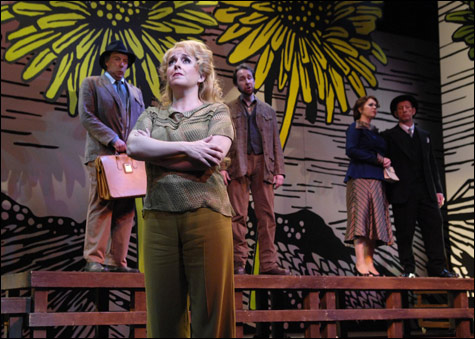Opera Boston's Smetana, the BSO's Berlioz, and Dawn Upshaw
By LLOYD SCHWARTZ | May 12, 2009

THE BARTERED BRIDE: It was disconcerting done in English, but the singers were mostly excellent, and Gil Rose led the terrific orchestra with panache and Bohemian lilt. |
It's been a long time since Bostonians had the chance to see the most popular Czech opera, Bedrich Smetana's The Bartered Bride, but Opera Boston followed its electrifying run of Shostakovich's The Nose with this tuneful folk opera and gave it a sweet and very likable production. A few different decisions might have made it even sweeter and more likable. The Nose was sung in the original Russian; The Bartered Bride was done in English, though the clunky translation ("He'll rue the day!") didn't begin to capture the Czech rhythms of the music. Then stage director/choreographer Daniel Pelzig decided that, since the language was English, why not set the action in a place where English is spoken? Like Spillville, Iowa. Dvorák visited the Czech community there, and that's where he composed his American Quartet.
This idea sounded better on paper than it turned out. The plot, like some of the music (from the fizzy overture to the patter songs), is proto–Gilbert & Sullivan, with its tickling logical/legalistic convolutions. The more "realistic" the approach, the less believable the comedy. The Iowans in Pelzig's conceit are enterprising enough to start a brewery right after Prohibition is repealed, so they're unlikely to enter into contracts in which brides are promised as repayments for debts. The neverland of Ruritanian operetta might have let us to suspend our disbelief more easily. (Smetana had first conceived his work as an operetta.) A colorful Czech village might have also reflected the folk elements of the score more vividly than costume designer Jennifer Caprio's repressed Midwest beiges and umbers, or set designer Michael B. Raiford's Rockwell Kent–ish backdrop woodcut of black-and-white rolling pastures (though he cleverly turned a table into a fence and then into a dock). When the dazzling circus people arrive in the third act, everything suddenly looked like the music we were hearing.
Still, I enjoyed myself. Gil Rose led the terrific orchestra with panache and Bohemian lilt. Pelzig choreographed the extended musical interludes for six gifted and witty young dancers from the Boston Conservatory; the rollicking parade of the circus folk, spinning and tumbling, brought down the house. And the mostly excellent singers all seemed comfortable in their characters. In the title role of the bride whose fiancé seems to have sold her for $300, Jennifer Aylmer has a gleaming soprano and seemed right at home on stage, conveying Marenka's smarts as well as her tender feelings. (Too bad the words to her poignant aria — "How dark the day that dawned so bright" — were more Iolanthe than Iowa.) Her beloved Jeník, bright-voiced tenor Patrick Miller, strained for his high notes but was an appealing if not exactly subtle hero. Superb tenor Keith Jameson was both touching and funny as the tongue-tied, stuttering Vasek and stole every scene he was in.
 Related
Related:
Opening pitch, John Harbison plus 10, A little history, More 
- Opening pitch
The most moving moment of this year’s Boston Symphony Orchestra opening gala came before the concert started — the standing ovation for James Levine, who looked rested and recuperated after his kidney surgery this summer, an operation that forced him to cancel most of his Tanglewood season.
- John Harbison plus 10
Classical music in Boston is so rich, having to pick 10 special events for this winter preview is more like one-tenth of the performances I'm actually looking forward to.
- A little history
Two of Boston's most admired and honored composers (both Pulitzer winners) have just celebrated landmark birthdays: Yehudi Wyner his 80th and John Harbison his 70th.
- Fall Classical Preview: The power of music
Here’s my Top 10 list, in chronological order, of some of the season’s most appealing and important classical music events: symphonies, chamber music, operas.
- James Levine: He's back!
Boston and New York have at least one thing in common. Both have missed James Levine, music director of two of the world's most renowned classical-music institutions.
- The Top 10 Classical Music Stories of 2010
The good, the not-so-good, and the departed
- Sing, sing, sing!: The 2011 winter opera forecast
For opera lovers, the offerings last fall were at best a little thin. But this winter, it seems, everyone's doin' it.
- Diva-gations
Last week's Boston Symphony concert was a snaggle of contradictions. British guest conductor Mark Wigglesworth was substituting for the exciting but erratic Russian maestro Yuri Termirkanov, who'd cancelled all his American appearances.
- Home cooking
If the name "National Philharmonic of Russia" puts you in mind of some provincial Slavic ensemble making the American rounds, you're not alone.
- Mixed blessings
The Boston Symphony Orchestra began the new year with one of its most disappointing concerts since music director James Levine took over.
- Oedipus schmoedipus
One of the Boston Symphony Orchestra's most famous concerts was one that didn't take place. Nearly 30 years ago, the BSO announced Stravinsky's Oedipus Rex , to be staged by Peter Sellars, with Vanessa Redgrave narrating.
- Less

 Topics
Topics:
Classical
, David Kravitz, Entertainment, Claude Debussy, More  , David Kravitz, Entertainment, Claude Debussy, William Bolcom, Olivier Messiaen, John Williams, Michael Ward-Bergeman, Symphony Hall, Dawn Upshaw, Dawn Upshaw, Less
, David Kravitz, Entertainment, Claude Debussy, William Bolcom, Olivier Messiaen, John Williams, Michael Ward-Bergeman, Symphony Hall, Dawn Upshaw, Dawn Upshaw, Less 